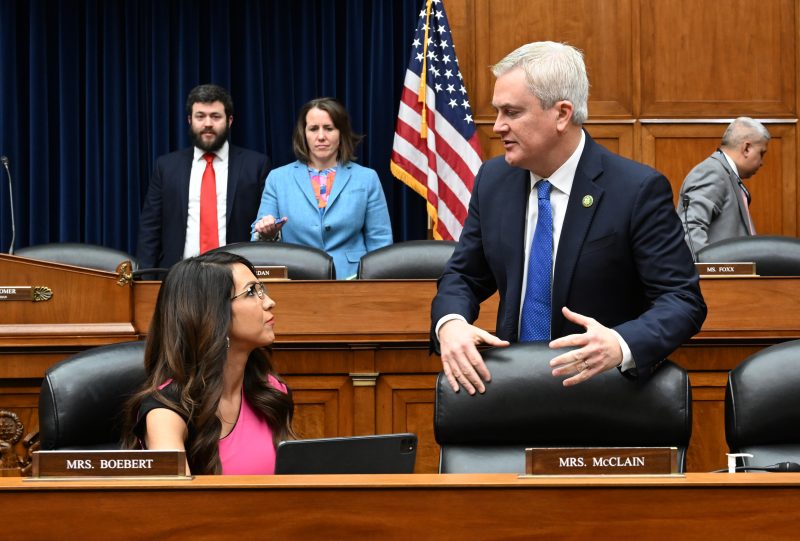House Republicans late Wednesday submitted their first request to President Biden’s family members, asking them to provide a range of documents related to foreign business dealings, and were immediately rebuffed by Hunter Biden’s attorney.
The request and rejection came in the form of competing letters that laid the groundwork for what is expected to be a drawn-out battle that raises questions about how far congressional oversight can reach into the activities of a president’s family members.
Rep. James Comer (R-Ky.), chairman of the House Oversight Committee, sent letters to Hunter Biden as well as the president’s brother, James Biden, and their former business partner Eric Schwerin. In his request to Hunter Biden, Comer asked for a wide range of communications with Joe and James Biden, as well as with James’s wife, Sara.
Comer also sought financial records, scheduling documents and rent payments.
The request for documents covers the period of Jan. 20, 2009, to Jan. 20, 2021 — extending from Joe Biden’s rise to the vice presidency until his swearing-in as president — and appears focused on business deals that Hunter Biden and his uncle pursued with a Chinese energy conglomerate.
The Washington Post examined that business arrangement in a story last year, finding that over the course of 14 months, the Chinese company and its executives paid $4.8 million to entities controlled by Hunter Biden and his uncle.
The Post did not find evidence that Joe Biden personally benefited from or knew details about the transactions with CEFC, which took place after he had left the vice presidency and before he announced his intentions to run for the White House in 2020.
“The American people deserve transparency and accountability about the Biden family’s influence peddling. The Oversight Committee is committed to exposing the waste, fraud, and abuse that has taken place at the highest levels of our government,” Comer said in a statement. “Hunter Biden, James Biden, and Eric Schwerin’s documents, records, and communications are critical to this investigation.”
While Hunter Biden’s legal team argues that he is a private citizen and Congress has no business investigating him, Comer and his allies say their interest is in potential legislation to strengthen federal ethics laws, making Hunter Biden’s business activities fair game for congressional scrutiny. This legal and political battle is likely to unfold for much of the upcoming campaign season.
“Evidence obtained in our investigation reveals the Biden family business model is built on Joe Biden’s political career and connections,” Comer said. “Biden family members attempted to sell access around the world, including to individuals who were connected to the Chinese Communist Party, to enrich themselves to the detriment of American interests. If President Biden is compromised by deals with foreign adversaries and they are impacting his decision-making, this is a threat to national security.”
Joe Biden has long denied any role in the business deals that were pursued by his son or his brother, and neither has any role in his administration.
The White House declined to comment. In the past, the administration has signaled that it would cooperate with congressional probes it views as legitimate, such as those focusing on Afghanistan or covid, but would be less likely to participate in those it views as strictly political, including investigations into the president’s son.
A spokeswoman for James Biden declined to comment, and Schwerin did not respond to a request for comment.
In a response to Comer sent on Thursday morning, Hunter Biden’s attorney Abbe Lowell challenged the committee’s authority to seek such documents.
“As your Letter is a sweeping attempt to collect an expansive array of documents and communications from President Biden and his family, I write to explain that the Committee on Oversight and Accountability lacks a legitimate legislative purpose and oversight basis for requesting such records from Mr. Biden, who is a private citizen,” Lowell wrote. He cited case law to say that Congress must have a legislative purpose to pursue records and cannot be a vehicle to undertake a criminal investigation.
He also mocked Comer’s claim to be examining ethics legislation.
“It is more than ironic, perhaps hypocritical, for Republican members who now hold the gavel to declare such a legitimate purpose, when, while in the minority, they were vocal opponents of House Democrats seeking similar information from President Trump and his family, some of whom held official government positions,” Lowell wrote, providing several comments from prominent House Republicans who criticized efforts to obtain records related to Trump and his family members.
The response reflects an aggressive strategy pursued by Lowell, who has a reputation as a hard-hitting attorney with long experience in navigating Washington’s crosscurrents of politics, messaging and the law. He argued that Hunter Biden holds no role in government and has no business ties to his father, and therefore is beyond the purview of congressional investigations.
“Whether you think Mr. Biden acted properly or not, and whether you think his private business dealings and associations are inappropriate or not, his behavior is that of a private citizen, not a public official,” Lowell wrote. He added, “That his father was a Senator, Vice President, or now President is not an endorsement of your choice to make every aspect of Mr. Biden’s personal life your political weapon.”
He also laid the groundwork to argue that separation-of-powers principles limit Congress’s authority to investigate a president’s family.
Lowell’s letter was notable for its tone as well as it content. It begins, “Peddling your own inaccurate and baseless conclusions under the guise of a real investigation turns the Committee into ‘Wonderland’ and you into the Queen of Hearts shouting, ‘Sentence first, verdict afterward.’”
Still, the four-page letter concluded with an offer to meet “to see whether Mr. Biden has information that may inform some legitimate legislative purpose and be helpful to the Committee.”

